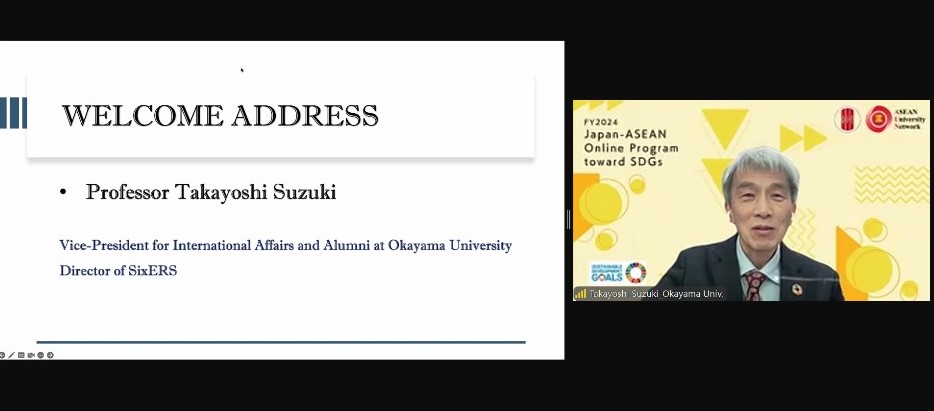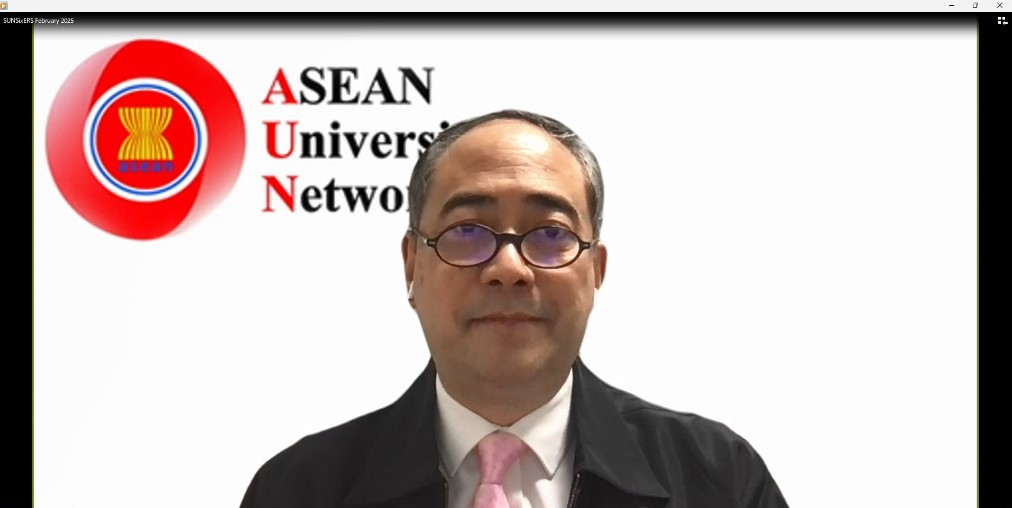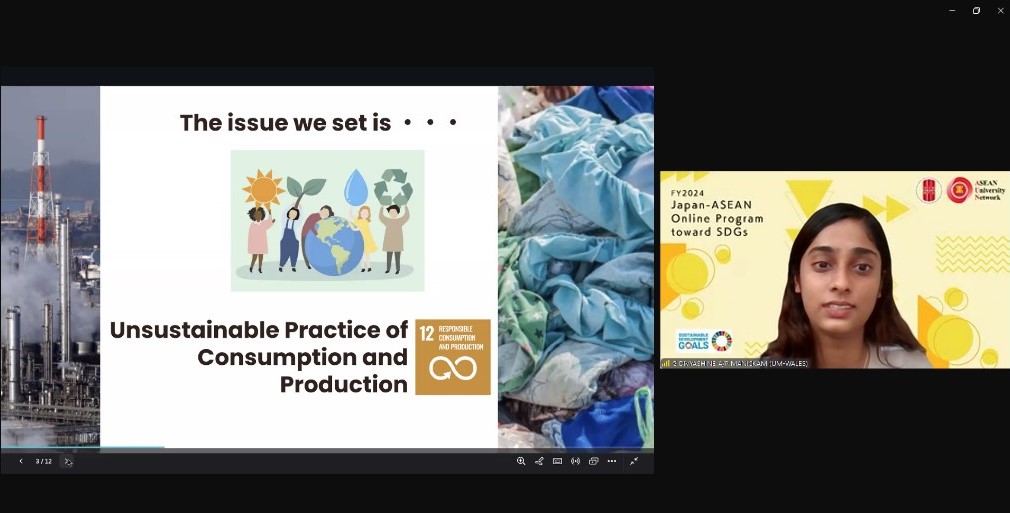Example
Japan-ASEAN Online Program toward SDGs 2024 Held
With the cooperation of Okayama University, Chiba University hosted the "Japan-ASEAN Online Program toward SDGs 2024," which was co-organized by the ASEAN University Network (AUN) and the Consortium of Six National Universities (SixERS). The online program took place from February 17th to 20th and included 57 students from AUN member universities and the six national universities (Chiba University, Niigata University, Kanazawa University, Okayama University, Nagasaki University, and Kumamoto University), with 37 participants from AUN and 20 from the six national universities.
The theme of the program was "Intercultural Exchange Online Workshop - Action Students Can Take on Environmental Issues," and it focused on finding solutions to environmental problems that align with SDGs (Sustainable Development Goals), specifically Goals 7, 11, 12, 13, 14, and 15*. During the program, ASEAN and Japanese students worked together to explore ways to address environmental challenges. The program received 871 applications, far exceeding the 50-person capacity, indicating a high level of interest in the theme.
In the opening ceremony, Choltis Dhirathiti, Executive Director of AUN, delivered a message to the participating students, and Vice President SUZUKI Takayoshi (for International Affairs and Alumni), Okayama University along with the Director of SixERS, gave greetings and encouraged the students.
The program included a lecture and facilitation by OKAYAMA Sakiko, Assistant Professor of the Chiba University Institute for Advanced Academic Research, who introduced the group work session. Students were divided into nine groups and, while learning about each other's cultural backgrounds, brainstormed ideas on how they could contribute as students to solving environmental issues such as marine biodiversity loss, deforestation, climate change, overproduction and overconsumption, air and water pollution, and waste management. Associate Professor INAMORI Takeo and Associate Professor Halimirzaev Saida from Global Human Resource Development, Okayama University also participated as co-faculty, supporting the students' group work.
On the final day of the program, each group presented their action plans for solving the environmental issues, sharing diverse ideas. During the closing ceremony, OZAWA Hiroaki, Executive Vice President for Education and International Affairs, Chiba University, encouraged the students to continue the exchange created during the program and to become future leaders in addressing global challenges.
AUN and the National Six Universities have been actively engaged in partnerships for over 10 years, based on a partnership agreement, including student exchanges through summer and spring programs and co-hosting academic seminars. It is expected that academic and research exchanges will continue to be promoted in collaboration with member universities.
*SDGs Goals 7, 11, 12, 13, 14, and 15:
Goal 7: Ensure access to affordable, reliable, sustainable, and modern energy for all.
Goal 11: Make cities and human settlements inclusive, safe, resilient, and sustainable.
Goal 12: Ensure sustainable consumption and production patterns.
Goal 13: Take urgent action to combat climate change and its impacts.
Goal 14: Conserve and sustainably use the oceans, seas, and marine resources for sustainable development.
Goal 15: Protect, restore, and promote sustainable use of terrestrial ecosystems.
Comment from Rihito Ichimoto, a first-year student from the Faculty of Pharmaceutical Sciences, Okayama University: "I discussed SDGs related to environmental issues with students from Japan's National Six Universities and ASEAN region's AUN. My group focused on marine biodiversity, especially the issue of marine debris. I was surprised to learn that 30% of the Pacific Garbage Patch comes from Japan, and that Japan is the second-largest consumer of plastic products worldwide. This program helped me rethink Japan's own environmental issues.
What left the strongest impression on me was meeting students from overseas who are full of personality. Some are working on SDGs using AI in graduate school, some can quickly create smartphone apps, and others exchanged contact information with every participant. I was inspired by their broad perspectives, technical skills, and passion. After the program, I’ve stayed in touch with them through social media and made great friends, which I consider the most significant outcome of this program. I am eager to continue participating in SDGs-related activities in the future."
Consortium of Six National Universities (SixERS): The Consortium of Six National Universities (SixERS) was established in March 2013 with the goal of enhancing the functions of education, academic research, and social contribution through mutual cooperation among the six national universities. It aims to promote the development of human resources who will lead the global society and to advance academic research.
National Six Universities International Cooperation Organization: The National Six Universities International Cooperation Organization promotes cooperation and collaboration in international activities among the six universities. Vice President Takayoshi Suzuki (International Relations and Alumni Affairs) of Okayama University serves as the Director of the organization.
―――――
"Please note that this content was translated by a machine and may contain errors."
―――――




The theme of the program was "Intercultural Exchange Online Workshop - Action Students Can Take on Environmental Issues," and it focused on finding solutions to environmental problems that align with SDGs (Sustainable Development Goals), specifically Goals 7, 11, 12, 13, 14, and 15*. During the program, ASEAN and Japanese students worked together to explore ways to address environmental challenges. The program received 871 applications, far exceeding the 50-person capacity, indicating a high level of interest in the theme.
In the opening ceremony, Choltis Dhirathiti, Executive Director of AUN, delivered a message to the participating students, and Vice President SUZUKI Takayoshi (for International Affairs and Alumni), Okayama University along with the Director of SixERS, gave greetings and encouraged the students.
The program included a lecture and facilitation by OKAYAMA Sakiko, Assistant Professor of the Chiba University Institute for Advanced Academic Research, who introduced the group work session. Students were divided into nine groups and, while learning about each other's cultural backgrounds, brainstormed ideas on how they could contribute as students to solving environmental issues such as marine biodiversity loss, deforestation, climate change, overproduction and overconsumption, air and water pollution, and waste management. Associate Professor INAMORI Takeo and Associate Professor Halimirzaev Saida from Global Human Resource Development, Okayama University also participated as co-faculty, supporting the students' group work.
On the final day of the program, each group presented their action plans for solving the environmental issues, sharing diverse ideas. During the closing ceremony, OZAWA Hiroaki, Executive Vice President for Education and International Affairs, Chiba University, encouraged the students to continue the exchange created during the program and to become future leaders in addressing global challenges.
AUN and the National Six Universities have been actively engaged in partnerships for over 10 years, based on a partnership agreement, including student exchanges through summer and spring programs and co-hosting academic seminars. It is expected that academic and research exchanges will continue to be promoted in collaboration with member universities.
*SDGs Goals 7, 11, 12, 13, 14, and 15:
Goal 7: Ensure access to affordable, reliable, sustainable, and modern energy for all.
Goal 11: Make cities and human settlements inclusive, safe, resilient, and sustainable.
Goal 12: Ensure sustainable consumption and production patterns.
Goal 13: Take urgent action to combat climate change and its impacts.
Goal 14: Conserve and sustainably use the oceans, seas, and marine resources for sustainable development.
Goal 15: Protect, restore, and promote sustainable use of terrestrial ecosystems.
Comment from Rihito Ichimoto, a first-year student from the Faculty of Pharmaceutical Sciences, Okayama University: "I discussed SDGs related to environmental issues with students from Japan's National Six Universities and ASEAN region's AUN. My group focused on marine biodiversity, especially the issue of marine debris. I was surprised to learn that 30% of the Pacific Garbage Patch comes from Japan, and that Japan is the second-largest consumer of plastic products worldwide. This program helped me rethink Japan's own environmental issues.
What left the strongest impression on me was meeting students from overseas who are full of personality. Some are working on SDGs using AI in graduate school, some can quickly create smartphone apps, and others exchanged contact information with every participant. I was inspired by their broad perspectives, technical skills, and passion. After the program, I’ve stayed in touch with them through social media and made great friends, which I consider the most significant outcome of this program. I am eager to continue participating in SDGs-related activities in the future."
Consortium of Six National Universities (SixERS): The Consortium of Six National Universities (SixERS) was established in March 2013 with the goal of enhancing the functions of education, academic research, and social contribution through mutual cooperation among the six national universities. It aims to promote the development of human resources who will lead the global society and to advance academic research.
National Six Universities International Cooperation Organization: The National Six Universities International Cooperation Organization promotes cooperation and collaboration in international activities among the six universities. Vice President Takayoshi Suzuki (International Relations and Alumni Affairs) of Okayama University serves as the Director of the organization.
―――――
"Please note that this content was translated by a machine and may contain errors."
―――――

Group photo of participants

Vice President Suzuki delivering greetings

Choltis Dhirathiti, Secretary-General of AUN delivering a message to students

Presentation session
